Презентация seasons

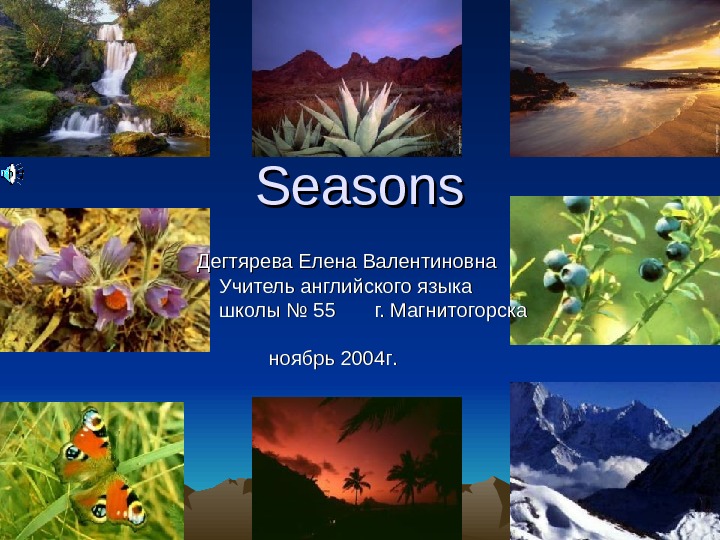
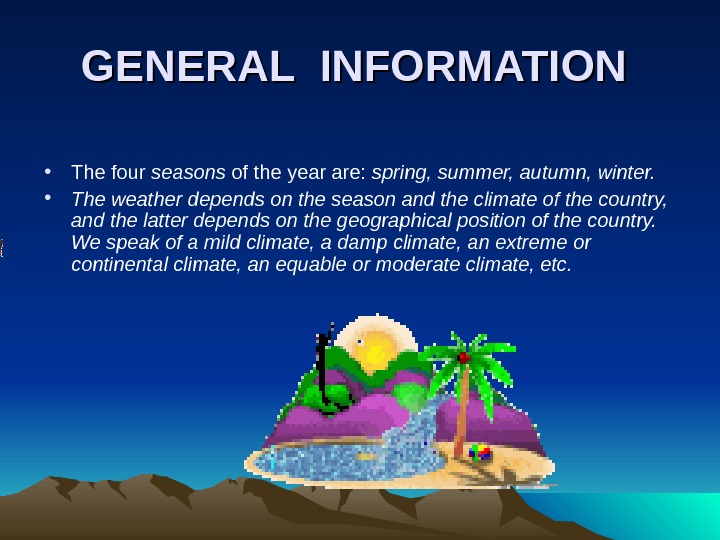
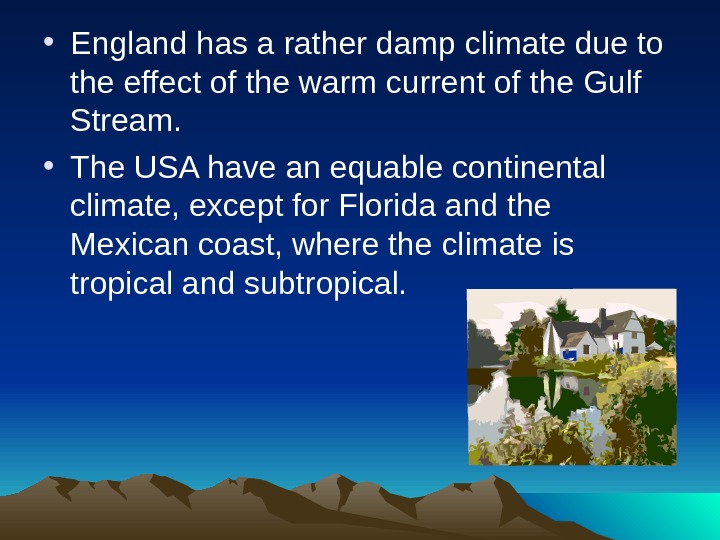
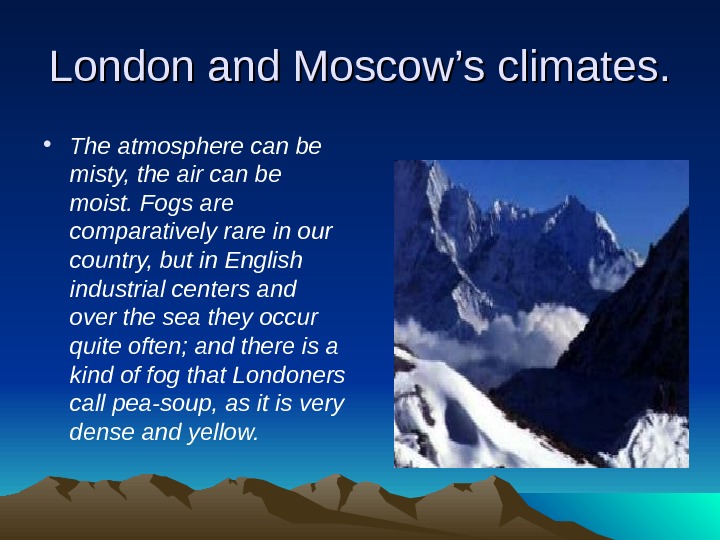
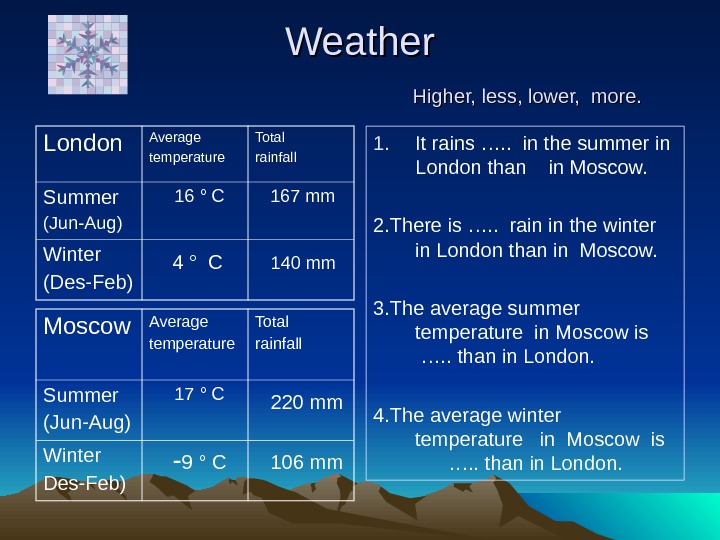
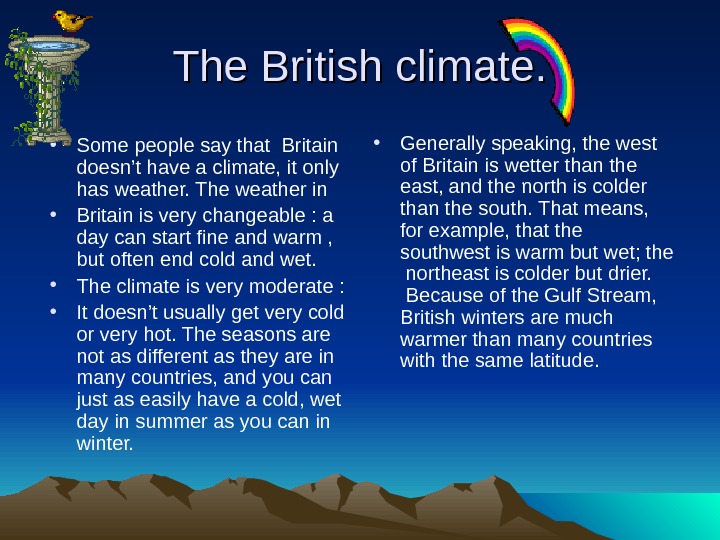
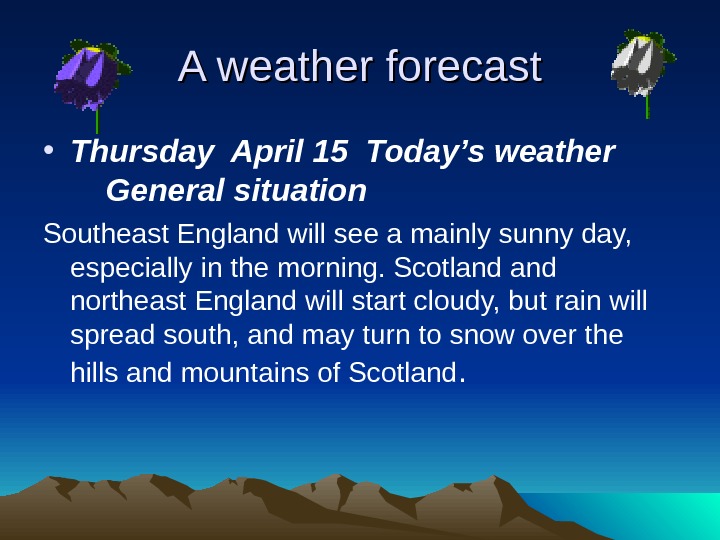
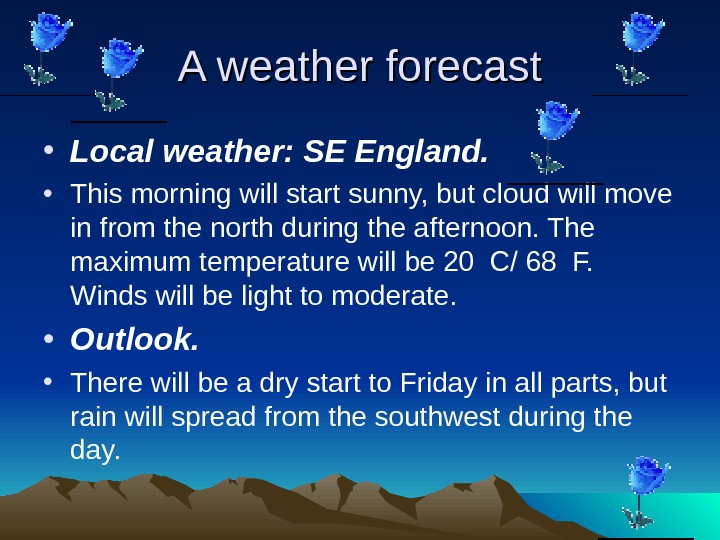
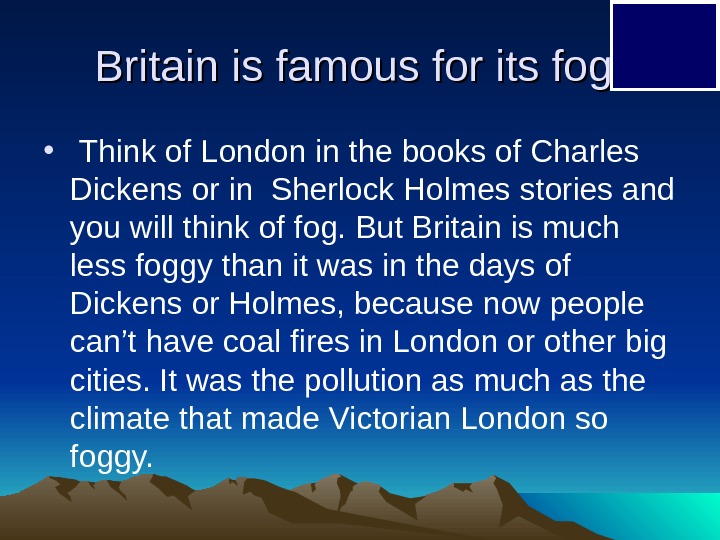
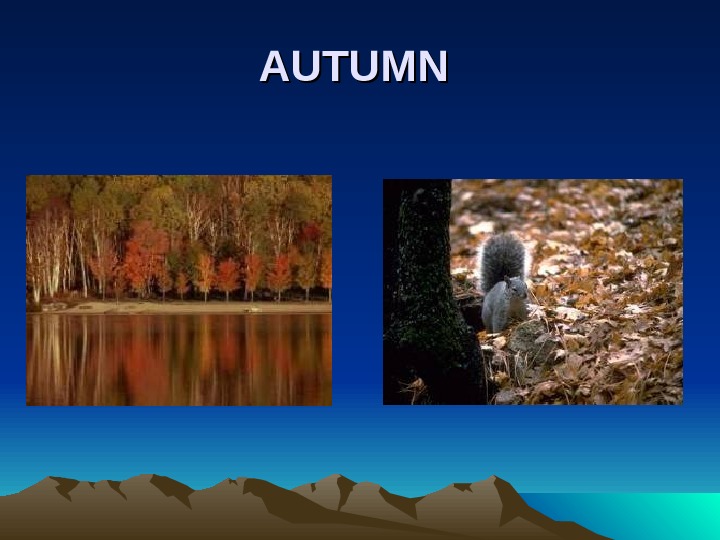
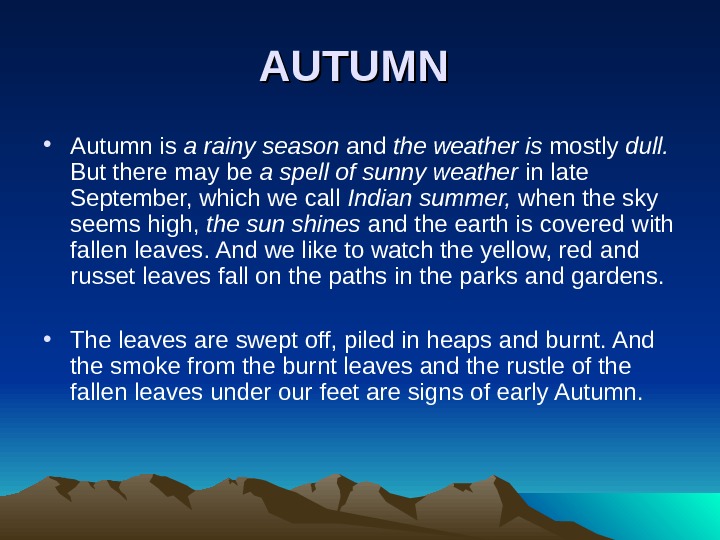
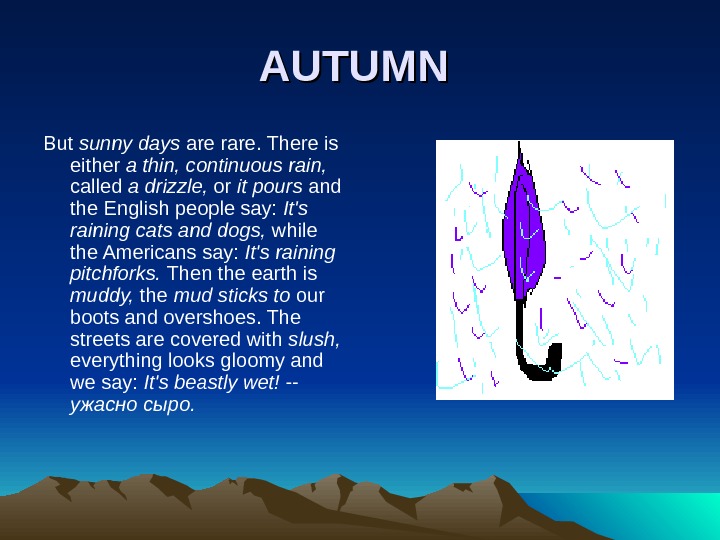
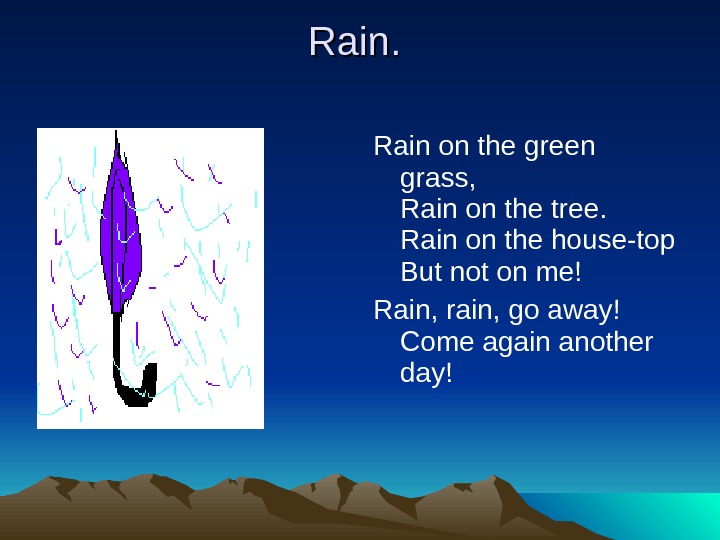
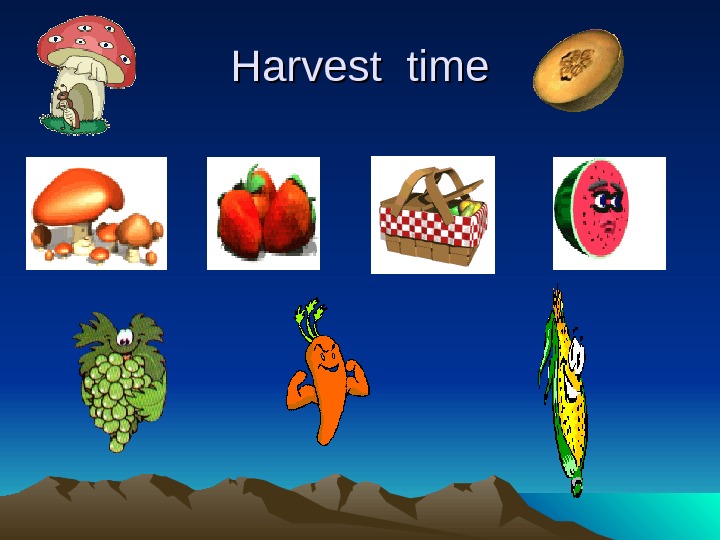
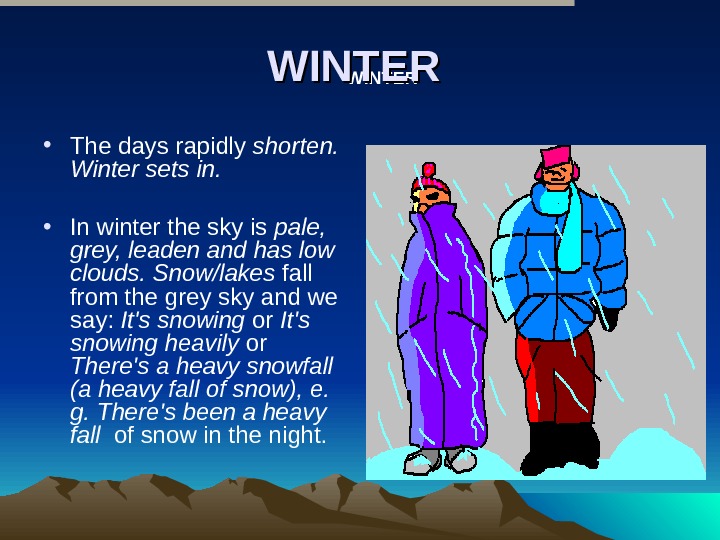
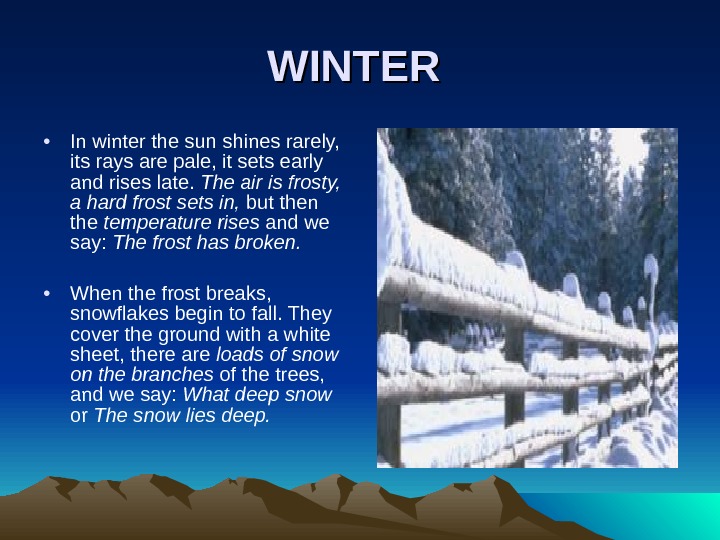
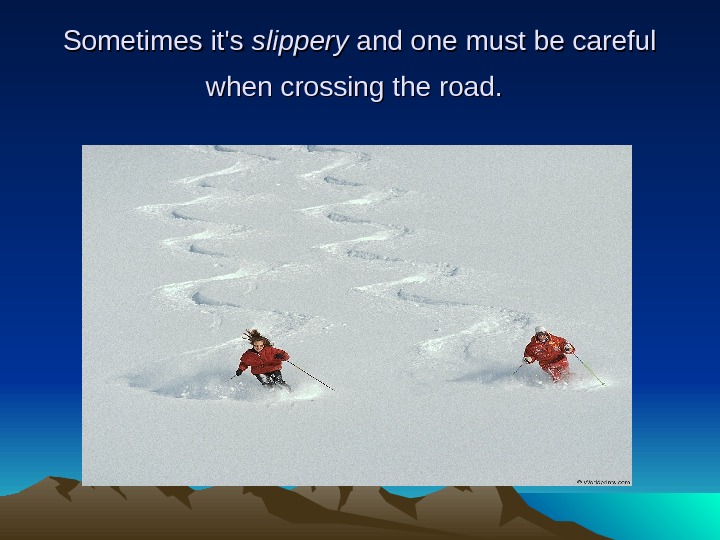
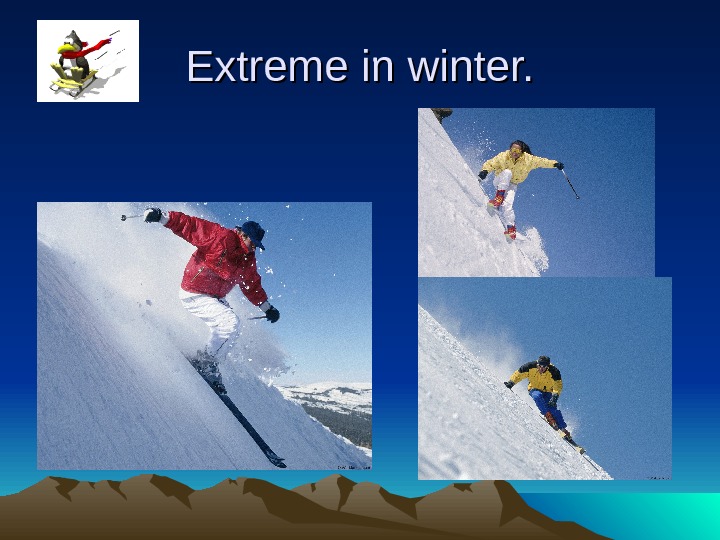
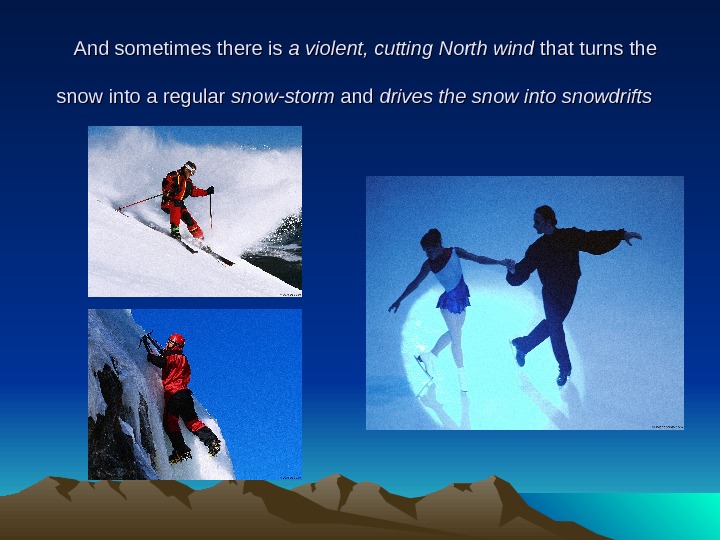
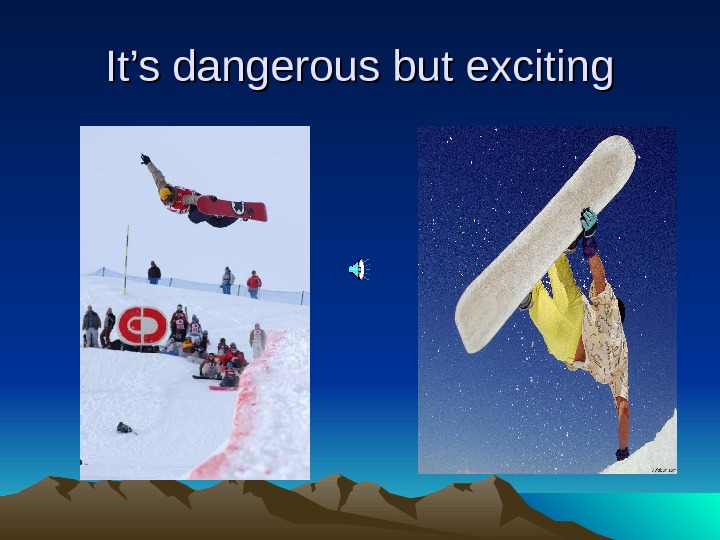
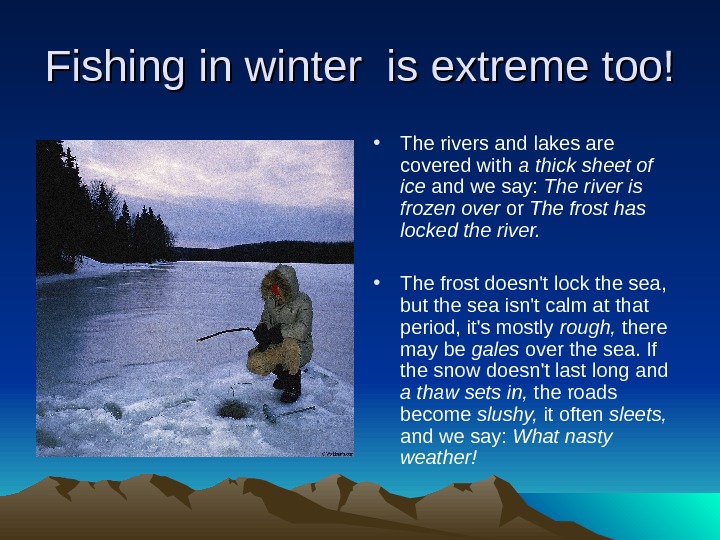
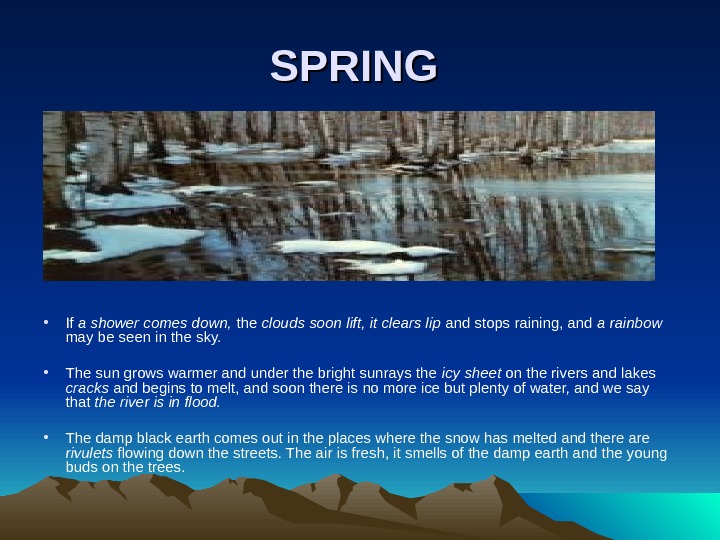
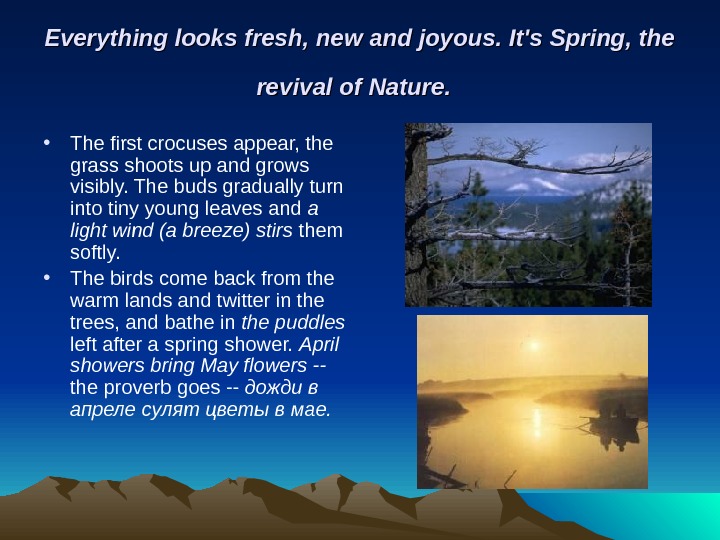
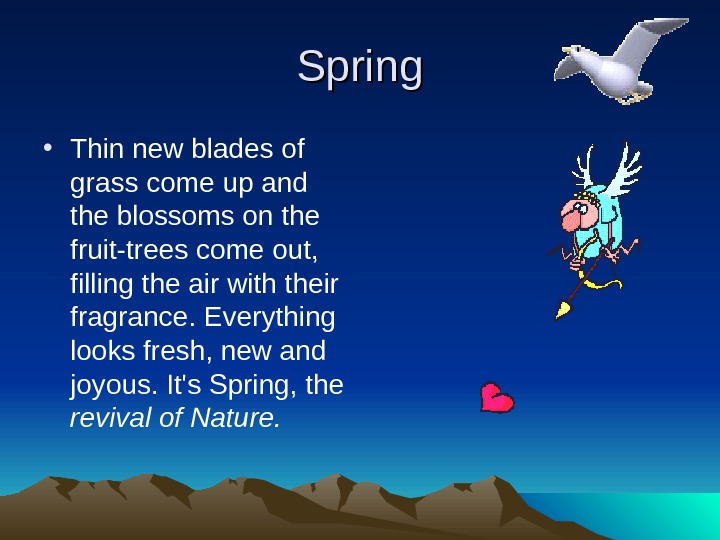
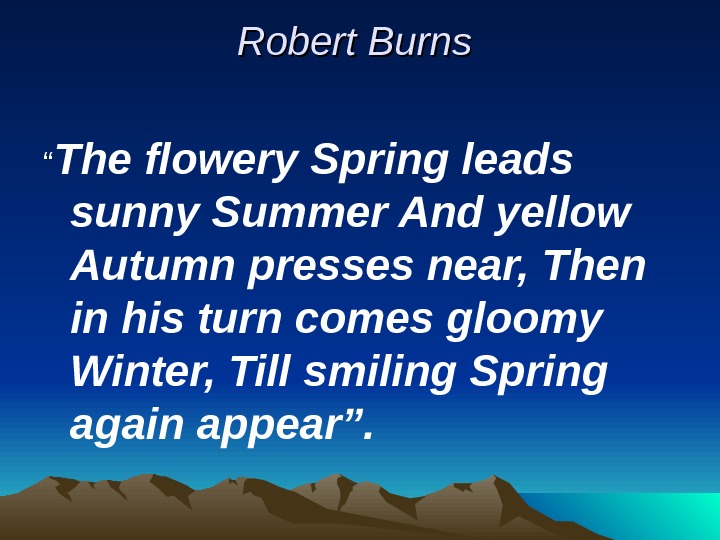
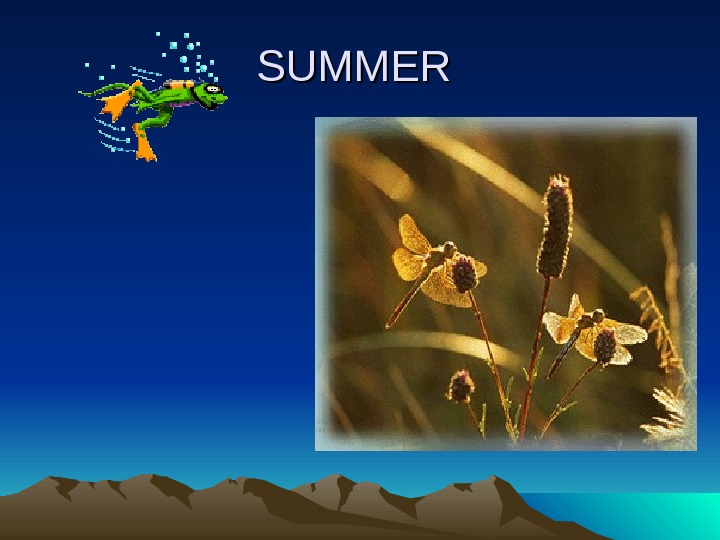
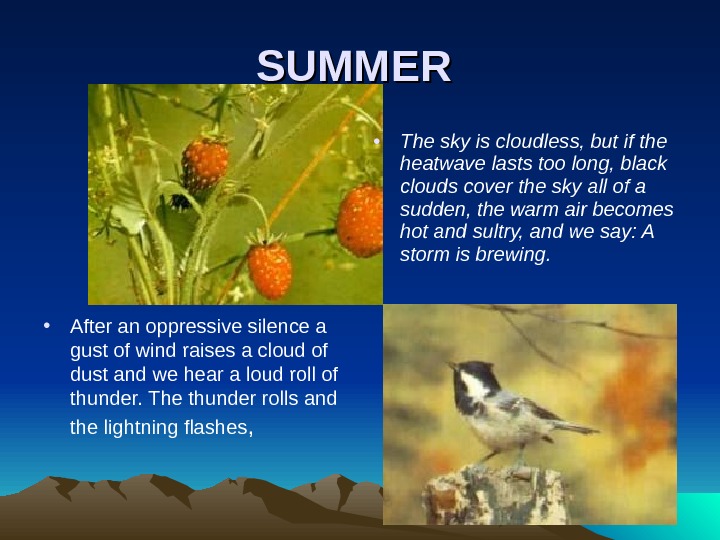
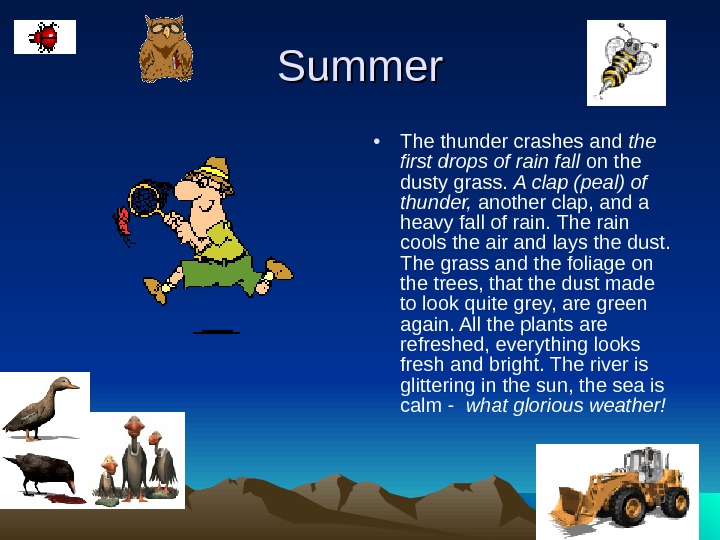
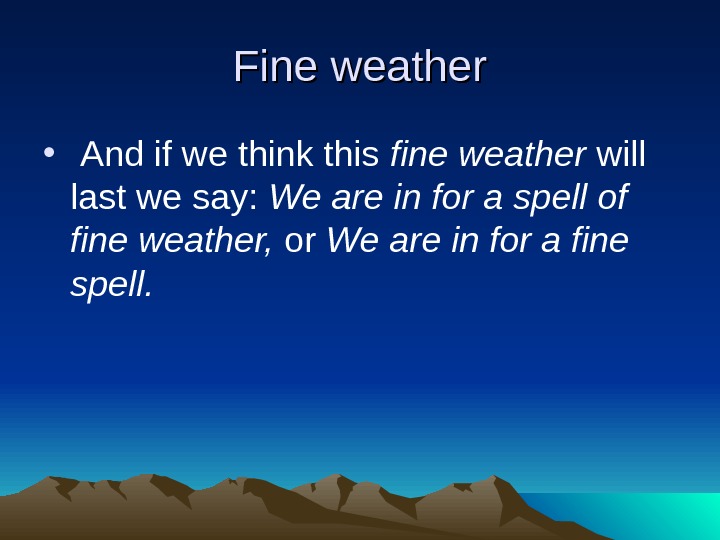
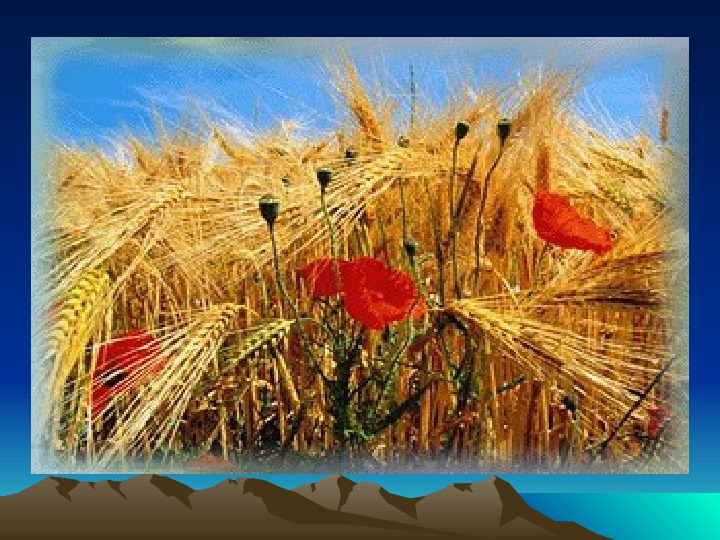
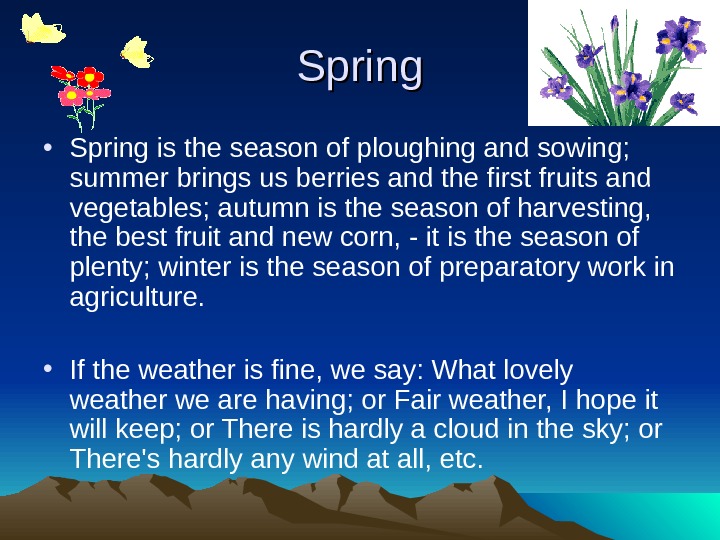
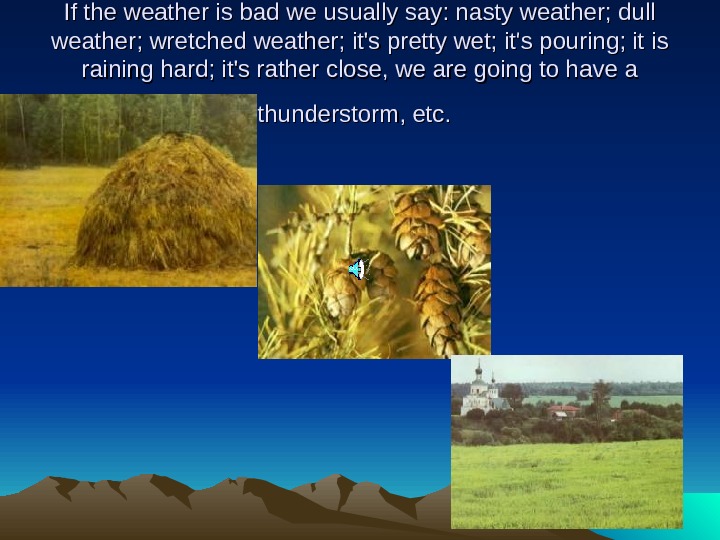
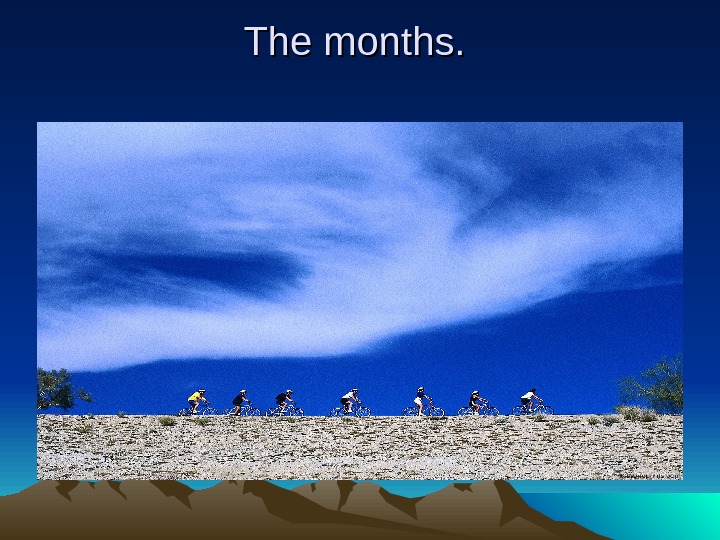
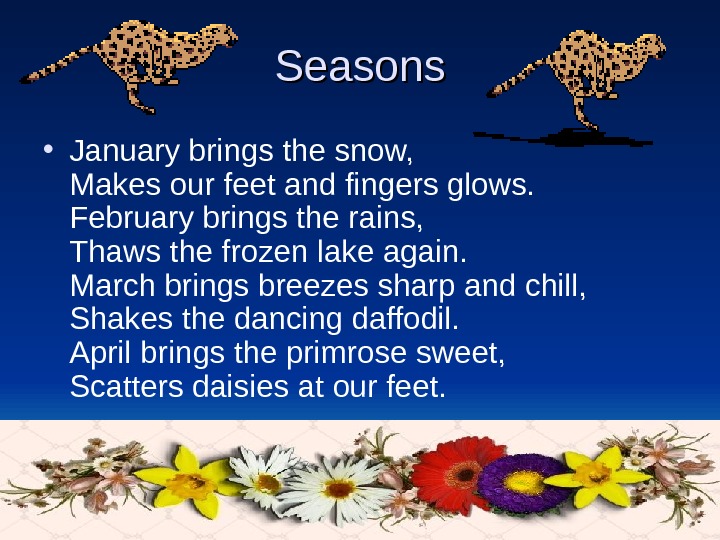
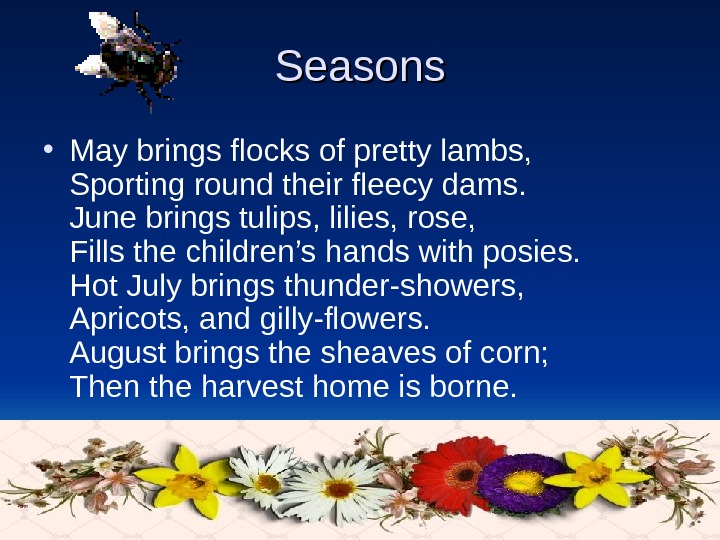
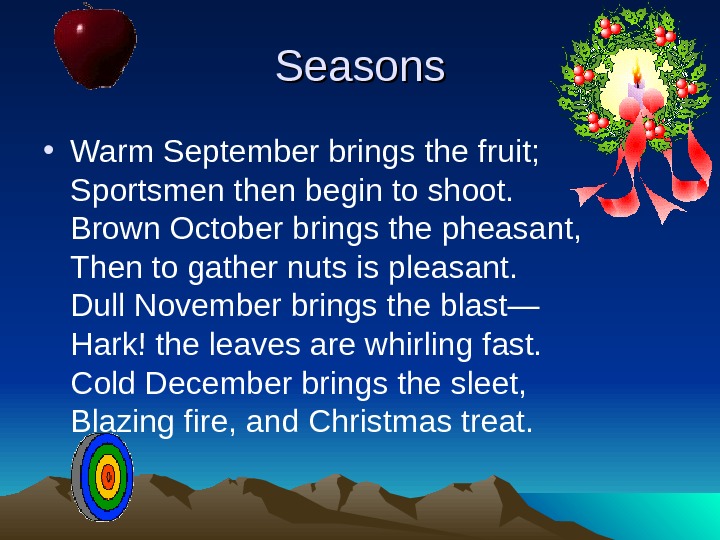
- Размер: 5.1 Mегабайта
- Количество слайдов: 36
Описание презентации Презентация seasons по слайдам
 Seasons Дегтярева Елена Валентиновна Учитель английского языка школы № 55 г. Магнитогорска ноябрь 2004 гг. .
Seasons Дегтярева Елена Валентиновна Учитель английского языка школы № 55 г. Магнитогорска ноябрь 2004 гг. .
 GENERALINFORMATION • The four seasons of the year are: spring, summer, autumn, winter. • The weather depends on the season and the climate of the country, and the latter depends on the geographical position of the country. We speak of a mild climate, a damp climate, an extreme or continental climate, an equable or moderate climate, etc.
GENERALINFORMATION • The four seasons of the year are: spring, summer, autumn, winter. • The weather depends on the season and the climate of the country, and the latter depends on the geographical position of the country. We speak of a mild climate, a damp climate, an extreme or continental climate, an equable or moderate climate, etc.
 • England has a rather damp climate due to the effect of the warm current of the Gulf Stream. • The USA have an equable continental climate, except for Florida and the Mexican coast, where the climate is tropical and subtropical.
• England has a rather damp climate due to the effect of the warm current of the Gulf Stream. • The USA have an equable continental climate, except for Florida and the Mexican coast, where the climate is tropical and subtropical.
 London and Moscow’s climates. • The atmosphere can be misty, the air can be moist. Fogs are comparatively rare in our country, but in English industrial centers and over the sea they occur quite often; and there is a kind of fog that Londoners call pea-soup, as it is very dense and yellow.
London and Moscow’s climates. • The atmosphere can be misty, the air can be moist. Fogs are comparatively rare in our country, but in English industrial centers and over the sea they occur quite often; and there is a kind of fog that Londoners call pea-soup, as it is very dense and yellow.
 Weather Higher, less, lower, more. 1. It rains …. . in the summer in London than in Moscow. 2. There is …. . rain in the winter in London than in Moscow. 3. The average summer temperature in Moscow is …. . than in London. 4. The average winter temperature in Moscow is …. . than in London Average temperature Total rainfall Summer (Jun-Aug) 16 ° C 167 mm Winter (Des-Feb) 4 ° C 140 mm Moscow Average temperature Total rainfall Summer (Jun-Aug) 17 ° C 220 mm Winter Des-Feb) — 9 ° C 106 mm
Weather Higher, less, lower, more. 1. It rains …. . in the summer in London than in Moscow. 2. There is …. . rain in the winter in London than in Moscow. 3. The average summer temperature in Moscow is …. . than in London. 4. The average winter temperature in Moscow is …. . than in London Average temperature Total rainfall Summer (Jun-Aug) 16 ° C 167 mm Winter (Des-Feb) 4 ° C 140 mm Moscow Average temperature Total rainfall Summer (Jun-Aug) 17 ° C 220 mm Winter Des-Feb) — 9 ° C 106 mm
 The British climate. • Some people say that Britain doesn’t have a climate, it only has weather. The weather in • Britain is very changeable : a day can start fine and warm , but often end cold and wet. • The climate is very moderate : • It doesn’t usually get very cold or very hot. The seasons are not as different as they are in many countries, and you can just as easily have a cold, wet day in summer as you can in winter. • Generally speaking, the west of Britain is wetter than the east, and the north is colder than the south. That means, for example, that the southwest is warm but wet; the northeast is colder but drier. Because of the Gulf Stream, British winters are much warmer than many countries with the same latitude.
The British climate. • Some people say that Britain doesn’t have a climate, it only has weather. The weather in • Britain is very changeable : a day can start fine and warm , but often end cold and wet. • The climate is very moderate : • It doesn’t usually get very cold or very hot. The seasons are not as different as they are in many countries, and you can just as easily have a cold, wet day in summer as you can in winter. • Generally speaking, the west of Britain is wetter than the east, and the north is colder than the south. That means, for example, that the southwest is warm but wet; the northeast is colder but drier. Because of the Gulf Stream, British winters are much warmer than many countries with the same latitude.
 A weather forecast • Thursday April 15 Today’s weather General situation Southeast England will see a mainly sunny day, especially in the morning. Scotland northeast England will start cloudy, but rain will spread south, and may turn to snow over the hills and mountains of Scotland.
A weather forecast • Thursday April 15 Today’s weather General situation Southeast England will see a mainly sunny day, especially in the morning. Scotland northeast England will start cloudy, but rain will spread south, and may turn to snow over the hills and mountains of Scotland.
 A weather forecast • Local weather: SE England. • This morning will start sunny, but cloud will move in from the north during the afternoon. The maximum temperature will be 20 C/ 68 F. Winds will be light to moderate. • Outlook. • There will be a dry start to Friday in all parts, but rain will spread from the southwest during the day.
A weather forecast • Local weather: SE England. • This morning will start sunny, but cloud will move in from the north during the afternoon. The maximum temperature will be 20 C/ 68 F. Winds will be light to moderate. • Outlook. • There will be a dry start to Friday in all parts, but rain will spread from the southwest during the day.
 Britain is famous for its fog. • Think of London in the books of Charles Dickens or in Sherlock Holmes stories and you will think of fog. But Britain is much less foggy than it was in the days of Dickens or Holmes, because now people can’t have coal fires in London or other big cities. It was the pollution as much as the climate that made Victorian London so foggy.
Britain is famous for its fog. • Think of London in the books of Charles Dickens or in Sherlock Holmes stories and you will think of fog. But Britain is much less foggy than it was in the days of Dickens or Holmes, because now people can’t have coal fires in London or other big cities. It was the pollution as much as the climate that made Victorian London so foggy.
 AUTUMN
AUTUMN
 AUTUMN • Autumn is a rainy season and the weather is mostly dull. But there may be a spell of sunny weather in late September, which we call Indian summer, when the sky seems high, the sun shines and the earth is covered with fallen leaves. And we like to watch the yellow, red and russet leaves fall on the paths in the parks and gardens. • The leaves are swept off, piled in heaps and burnt. And the smoke from the burnt leaves and the rustle of the fallen leaves under our feet are signs of early Autumn.
AUTUMN • Autumn is a rainy season and the weather is mostly dull. But there may be a spell of sunny weather in late September, which we call Indian summer, when the sky seems high, the sun shines and the earth is covered with fallen leaves. And we like to watch the yellow, red and russet leaves fall on the paths in the parks and gardens. • The leaves are swept off, piled in heaps and burnt. And the smoke from the burnt leaves and the rustle of the fallen leaves under our feet are signs of early Autumn.
 AUTUMN But sunny days are rare. There is either a thin, continuous rain, called a drizzle, or it pours and the English people say: It’s raining cats and dogs, while the Americans say: It’s raining pitchforks. Then the earth is muddy, the mud sticks to our boots and overshoes. The streets are covered with slush, everything looks gloomy and we say: It’s beastly wet! — ужасно сыро.
AUTUMN But sunny days are rare. There is either a thin, continuous rain, called a drizzle, or it pours and the English people say: It’s raining cats and dogs, while the Americans say: It’s raining pitchforks. Then the earth is muddy, the mud sticks to our boots and overshoes. The streets are covered with slush, everything looks gloomy and we say: It’s beastly wet! — ужасно сыро.
 Rain on the green grass, Rain on the tree. Rain on the house-top But not on me! Rain, rain, go away! Come again another day!
Rain on the green grass, Rain on the tree. Rain on the house-top But not on me! Rain, rain, go away! Come again another day!
 Harvest time
Harvest time
 • The days rapidly shorten. Winter sets in. • In winter the sky is pale, grey, leaden and has low clouds. Snow/lakes fall from the grey sky and we say: It’s snowing or It’s snowing heavily or There’s a heavy snowfall (a heavy fall of snow), e. g. There’s been a heavy fall of snow in the night. WINTERWINTER
• The days rapidly shorten. Winter sets in. • In winter the sky is pale, grey, leaden and has low clouds. Snow/lakes fall from the grey sky and we say: It’s snowing or It’s snowing heavily or There’s a heavy snowfall (a heavy fall of snow), e. g. There’s been a heavy fall of snow in the night. WINTERWINTER
 WINTER • In winter the sun shines rarely, its rays are pale, it sets early and rises late. The air is frosty, a hard frost sets in, but then the temperature rises and we say: The frost has broken. • When the frost breaks, snowflakes begin to fall. They cover the ground with a white sheet, there are loads of snow on the branches of the trees, and we say: What deep snow or The snow lies deep.
WINTER • In winter the sun shines rarely, its rays are pale, it sets early and rises late. The air is frosty, a hard frost sets in, but then the temperature rises and we say: The frost has broken. • When the frost breaks, snowflakes begin to fall. They cover the ground with a white sheet, there are loads of snow on the branches of the trees, and we say: What deep snow or The snow lies deep.
 Sometimes it’s slippery and one must be careful when crossing the road.
Sometimes it’s slippery and one must be careful when crossing the road.
 Extreme in winter.
Extreme in winter.
 And sometimes there is a violent, cutting North wind that turns the snow into a regular snow-storm and drives the snow into snowdrifts
And sometimes there is a violent, cutting North wind that turns the snow into a regular snow-storm and drives the snow into snowdrifts
 It’s dangerous but exciting
It’s dangerous but exciting
 Fishing in winter is extreme too! • The rivers and lakes are covered with a thick sheet of ice and we say: The river is frozen over or The frost has locked the river. • The frost doesn’t lock the sea, but the sea isn’t calm at that period, it’s mostly rough, there may be gales over the sea. If the snow doesn’t last long and a thaw sets in, the roads become slushy, it often sleets, and we say: What nasty weather!
Fishing in winter is extreme too! • The rivers and lakes are covered with a thick sheet of ice and we say: The river is frozen over or The frost has locked the river. • The frost doesn’t lock the sea, but the sea isn’t calm at that period, it’s mostly rough, there may be gales over the sea. If the snow doesn’t last long and a thaw sets in, the roads become slushy, it often sleets, and we say: What nasty weather!
 SPRING • If a shower comes down, the clouds soon lift, it clears lip and stops raining, and a rainbow may be seen in the sky. • The sun grows warmer and under the bright sunrays the icy sheet on the rivers and lakes cracks and begins to melt, and soon there is no more ice but plenty of water, and we say that the river is in flood. • The damp black earth comes out in the places where the snow has melted and there are rivulets flowing down the streets. The air is fresh, it smells of the damp earth and the young buds on the trees.
SPRING • If a shower comes down, the clouds soon lift, it clears lip and stops raining, and a rainbow may be seen in the sky. • The sun grows warmer and under the bright sunrays the icy sheet on the rivers and lakes cracks and begins to melt, and soon there is no more ice but plenty of water, and we say that the river is in flood. • The damp black earth comes out in the places where the snow has melted and there are rivulets flowing down the streets. The air is fresh, it smells of the damp earth and the young buds on the trees.
 Everything looks fresh, new and joyous. It’s Spring, the revival of Nature. • The first crocuses appear, the grass shoots up and grows visibly. The buds gradually turn into tiny young leaves and a light wind (a breeze) stirs them softly. • The birds come back from the warm lands and twitter in the trees, and bathe in the puddles left after a spring shower. April showers bring May flowers — the proverb goes — дожди в апреле сулят цветы в мае.
Everything looks fresh, new and joyous. It’s Spring, the revival of Nature. • The first crocuses appear, the grass shoots up and grows visibly. The buds gradually turn into tiny young leaves and a light wind (a breeze) stirs them softly. • The birds come back from the warm lands and twitter in the trees, and bathe in the puddles left after a spring shower. April showers bring May flowers — the proverb goes — дожди в апреле сулят цветы в мае.
 Spring • Thin new blades of grass come up and the blossoms on the fruit-trees come out, filling the air with their fragrance. Everything looks fresh, new and joyous. It’s Spring, the revival of Nature.
Spring • Thin new blades of grass come up and the blossoms on the fruit-trees come out, filling the air with their fragrance. Everything looks fresh, new and joyous. It’s Spring, the revival of Nature.
 Robert Burns “ The flowery Spring leads sunny Summer And yellow Autumn presses near, Then in his turn comes gloomy Winter, Till smiling Spring again appear”.
Robert Burns “ The flowery Spring leads sunny Summer And yellow Autumn presses near, Then in his turn comes gloomy Winter, Till smiling Spring again appear”.
 SUMMER
SUMMER
 SUMMER • After an oppressive silence a gust of wind raises a cloud of dust and we hear a loud roll of thunder. The thunder rolls and the lightning flashes , • The sky is cloudless, but if the heatwave lasts too long, black clouds cover the sky all of a sudden, the warm air becomes hot and sultry, and we say: A storm is brewing.
SUMMER • After an oppressive silence a gust of wind raises a cloud of dust and we hear a loud roll of thunder. The thunder rolls and the lightning flashes , • The sky is cloudless, but if the heatwave lasts too long, black clouds cover the sky all of a sudden, the warm air becomes hot and sultry, and we say: A storm is brewing.
 Summer • The thunder crashes and the first drops of rain fall on the dusty grass. A clap (peal) of thunder, another clap, and a heavy fall of rain. The rain cools the air and lays the dust. The grass and the foliage on the trees, that the dust made to look quite grey, are green again. All the plants are refreshed, everything looks fresh and bright. The river is glittering in the sun, the sea is calm — what glorious weather!
Summer • The thunder crashes and the first drops of rain fall on the dusty grass. A clap (peal) of thunder, another clap, and a heavy fall of rain. The rain cools the air and lays the dust. The grass and the foliage on the trees, that the dust made to look quite grey, are green again. All the plants are refreshed, everything looks fresh and bright. The river is glittering in the sun, the sea is calm — what glorious weather!
 Fine weather • And if we think this fine weather will last we say: We are in for a spell of fine weather, or We are in for a fine spell.
Fine weather • And if we think this fine weather will last we say: We are in for a spell of fine weather, or We are in for a fine spell.

 Spring • Spring is the season of ploughing and sowing; summer brings us berries and the first fruits and vegetables; autumn is the season of harvesting, the best fruit and new corn, — it is the season of plenty; winter is the season of preparatory work in agriculture. • If the weather is fine, we say: What lovely weather we are having; or Fair weather, I hope it will keep; or There is hardly a cloud in the sky; or There’s hardly any wind at all, etc.
Spring • Spring is the season of ploughing and sowing; summer brings us berries and the first fruits and vegetables; autumn is the season of harvesting, the best fruit and new corn, — it is the season of plenty; winter is the season of preparatory work in agriculture. • If the weather is fine, we say: What lovely weather we are having; or Fair weather, I hope it will keep; or There is hardly a cloud in the sky; or There’s hardly any wind at all, etc.
 If the weather is bad we usually say: nasty weather; dull weather; wretched weather; it’s pretty wet; it’s pouring; it is raining hard; it’s rather close, we are going to have a thunderstorm, etc.
If the weather is bad we usually say: nasty weather; dull weather; wretched weather; it’s pretty wet; it’s pouring; it is raining hard; it’s rather close, we are going to have a thunderstorm, etc.
 The months.
The months.
 Seasons • January brings the snow, Makes our feet and fingers glows. February brings the rains, Thaws the frozen lake again. March brings breezes sharp and chill, Shakes the dancing daffodil. April brings the primrose sweet, Scatters daisies at our feet.
Seasons • January brings the snow, Makes our feet and fingers glows. February brings the rains, Thaws the frozen lake again. March brings breezes sharp and chill, Shakes the dancing daffodil. April brings the primrose sweet, Scatters daisies at our feet.
 Seasons • May brings flocks of pretty lambs, Sporting round their fleecy dams. June brings tulips, lilies, rose, Fills the children’s hands with posies. Hot July brings thunder-showers, Apricots, and gilly-flowers. August brings the sheaves of corn; Then the harvest home is borne.
Seasons • May brings flocks of pretty lambs, Sporting round their fleecy dams. June brings tulips, lilies, rose, Fills the children’s hands with posies. Hot July brings thunder-showers, Apricots, and gilly-flowers. August brings the sheaves of corn; Then the harvest home is borne.
 Seasons • Warm September brings the fruit; Sportsmen then begin to shoot. Brown October brings the pheasant, Then to gather nuts is pleasant. Dull November brings the blast— Hark! the leaves are whirling fast. Cold December brings the sleet, Blazing fire, and Christmas treat.
Seasons • Warm September brings the fruit; Sportsmen then begin to shoot. Brown October brings the pheasant, Then to gather nuts is pleasant. Dull November brings the blast— Hark! the leaves are whirling fast. Cold December brings the sleet, Blazing fire, and Christmas treat.

